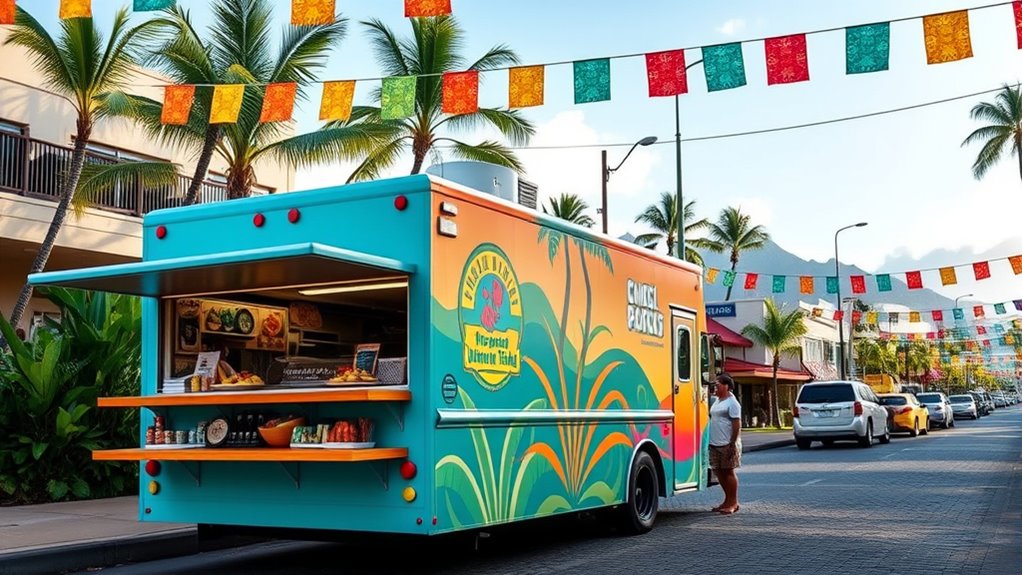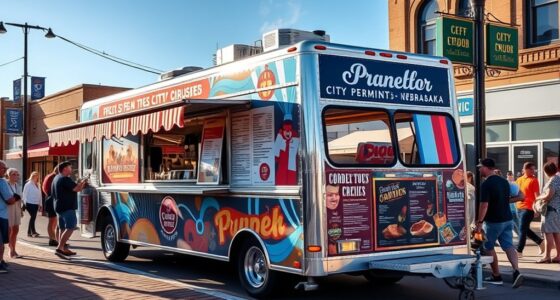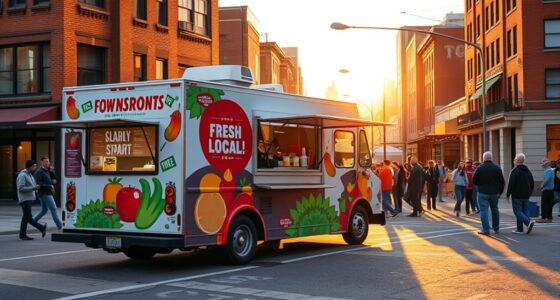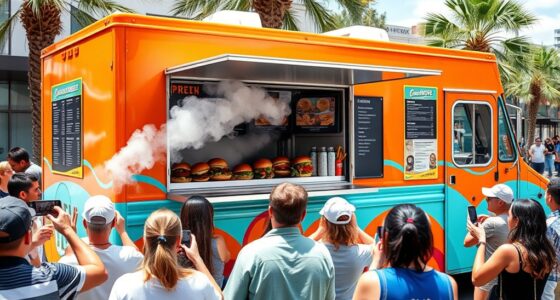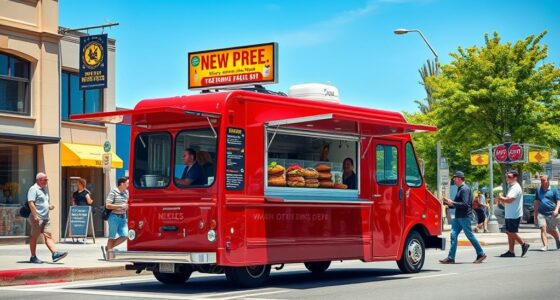To open a food truck in Hilo, Hawaii, you’ll need permits like a business license (~$20), a food establishment permit ($100-$400), and possibly a liquor license. You must pass health inspections and operate from approved support kitchens. Choose high-traffic locations such as highways or near schools, and develop a menu with local flavors like poke bowls or plate lunches. Use social media and participate in community events for marketing—learn more about setting up your successful truck here.
Key Takeaways
- Obtain necessary permits including a general business license, Food Establishment Permit, and possibly a liquor license, with costs ranging from ~$20 to $1,200.
- Ensure the support kitchen passes Hawaii DOH sanitation inspections; private home kitchens are not permitted.
- Ideal locations include high-traffic highways, roadside spots, near schools, and collaboration with local events.
- Develop menu options featuring Hawaiian flavors, locally sourced ingredients, and affordable, sustainable choices.
- Promote your truck via social media, participate in local events, and implement loyalty programs to grow your customer base.
Navigating the Permitting Process in Hilo
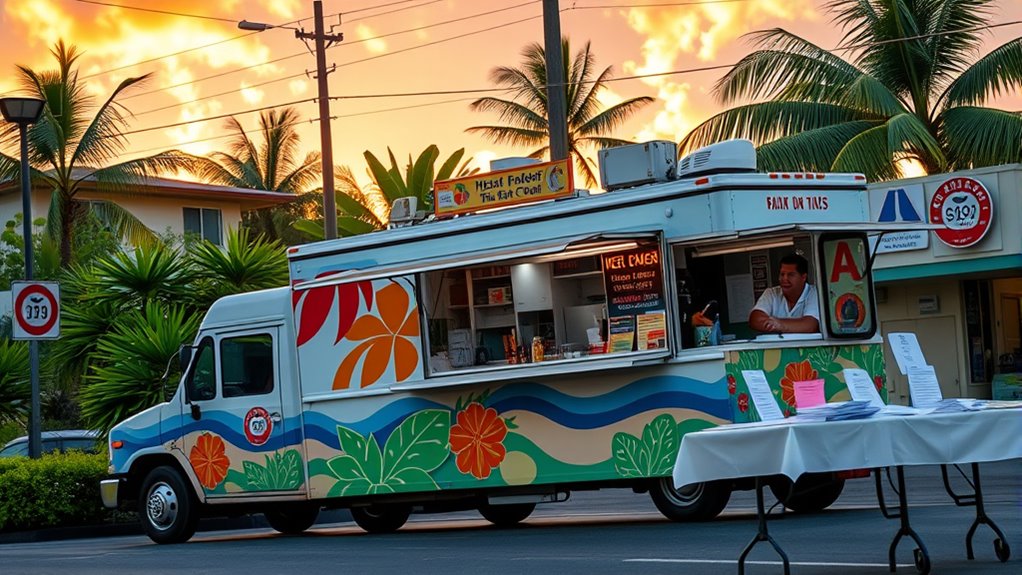
Understanding the permitting process in Hilo can seem complex, but grasping the necessary steps makes it manageable. First, you need a general business license, which costs about $20 through Hawaii Business Express. Next, secure a Food Establishment Permit from the Hawaii Department of Health, ranging from $100 to $400, to ensure hygiene and safety standards are met. You’ll also register for state taxes, including General Excise Tax and employee withholding, at no cost via the Department of Taxation. To operate your truck, get a Hawaii driver’s license, costing around $20-$40. If you plan to sell alcohol, apply for a liquor license from the County Department of Liquor Control, which can cost up to $1,200. These steps form the foundation of your mobile food business in Hilo, and understanding regulatory compliance is essential for a smooth launch.
Essential Inspection and Support Kitchen Standards
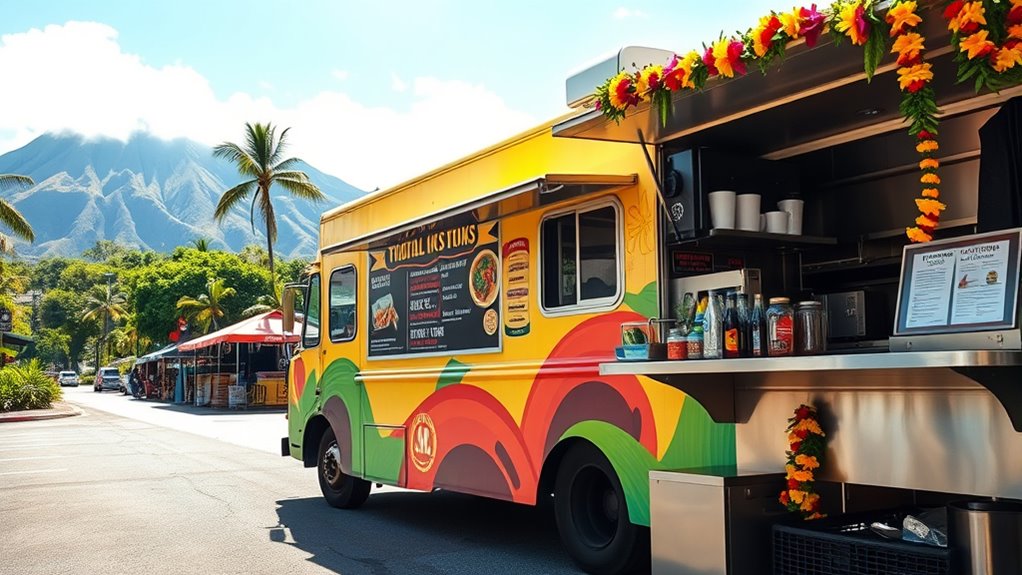
To operate a food truck in Hilo, Hawaii, both your mobile unit and support kitchen must pass strict sanitation inspections conducted by the Hawaii Department of Health (DOH). Your support kitchen needs a current Food Establishment Permit and must have adequate facilities for food prep and storage. Private home kitchens aren’t allowed. The inspector evaluates your business plan, menu, equipment, and infrastructure before approval. Both the truck and support kitchen are inspected for cleanliness, food safety, waste disposal, and sanitary conditions. Your support kitchen must have proper plumbing, refrigeration, and approved equipment maintained in good condition. Food handlers must complete a recognized safety course, and proper procedures for cleaning, storage, and cross-contamination prevention must be followed. Inspection reports are public and must be shared upon request. Compliance with local regulations is essential to avoid penalties and ensure a safe environment for your customers.
Finding Prime Locations for Your Food Truck
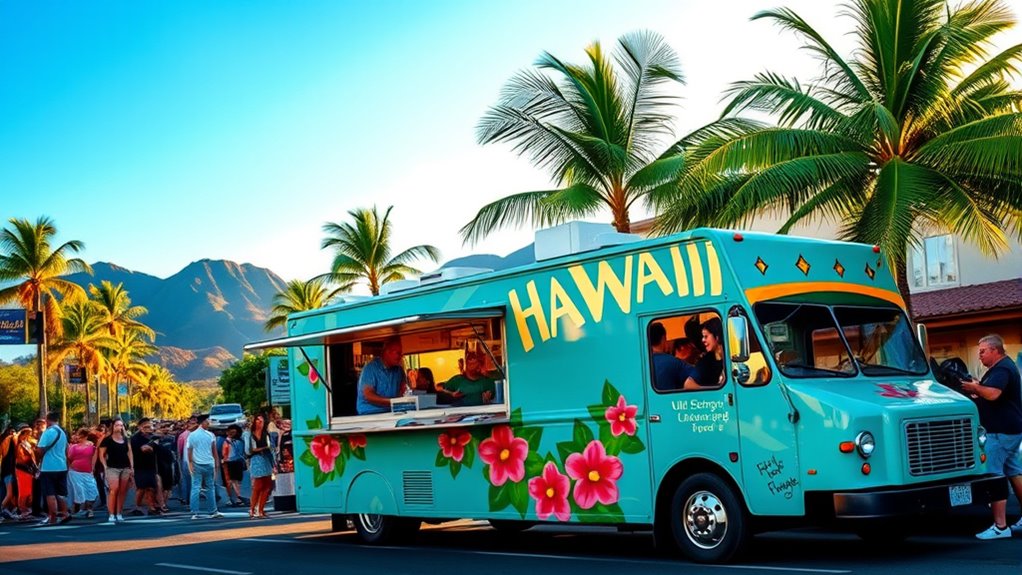
Choosing the right location is crucial for your food truck’s success in Hilo, Hawaii. High-traffic areas like Highway 130 from Kea’au to Pahoa attract locals and tourists craving diverse cuisines, from poke to Hawaiian dishes. Roadside spots along this highway boost visibility and spontaneous sales. In Hanalei, trucks like Hanalei Taro thrive during lunch, showing demand for local flavors. Near schools such as Hilo High and Hilo Union, foot traffic peaks at dismissal times, offering great opportunities. Central streets like Laimana St provide easy access for both locals and visitors. Factors like visibility, parking, zoning, and proximity to events or community hubs influence your choice. Collaborate with local businesses or secure spots at markets and festivals to maximize your reach and sales. Understanding the importance of location selection can significantly enhance your food truck’s profitability and longevity.
Crafting a Menu That Resonates With Local Tastes
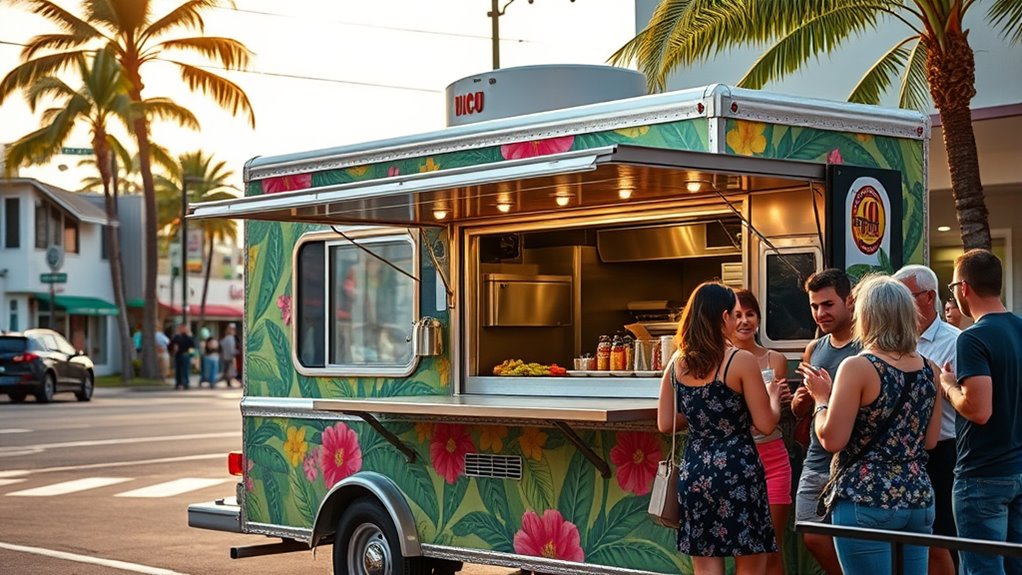
Crafting a menu that truly resonates with local tastes in Hilo means incorporating authentic Hawaiian flavors and ingredients that residents love. Include staples like loco moco, hearty plate lunches with saimin, and tropical fruit-based desserts like pineapple upside-down cake. Offer fresh poke bowls using locally sourced fish to appeal to coastal dining preferences. Use seasonal Hawaiian fruits, such as strawberry papayas, to enhance freshness and authenticity. Prioritize locally grown produce, herbs, and nuts from markets like the Hilo Farmers Market, supporting local agriculture. Price your menu affordably, considering economic challenges faced by many families. Incorporate local comfort foods with a twist and ensure a variety of options—meat, seafood, and vegetarian—to meet diverse tastes, especially appealing to younger consumers. Emphasizing STEM principles in your food truck’s operations, such as efficient workflow and sustainable practices, can also attract environmentally conscious customers.
Effective Marketing Strategies to Grow Your Food Truck Business
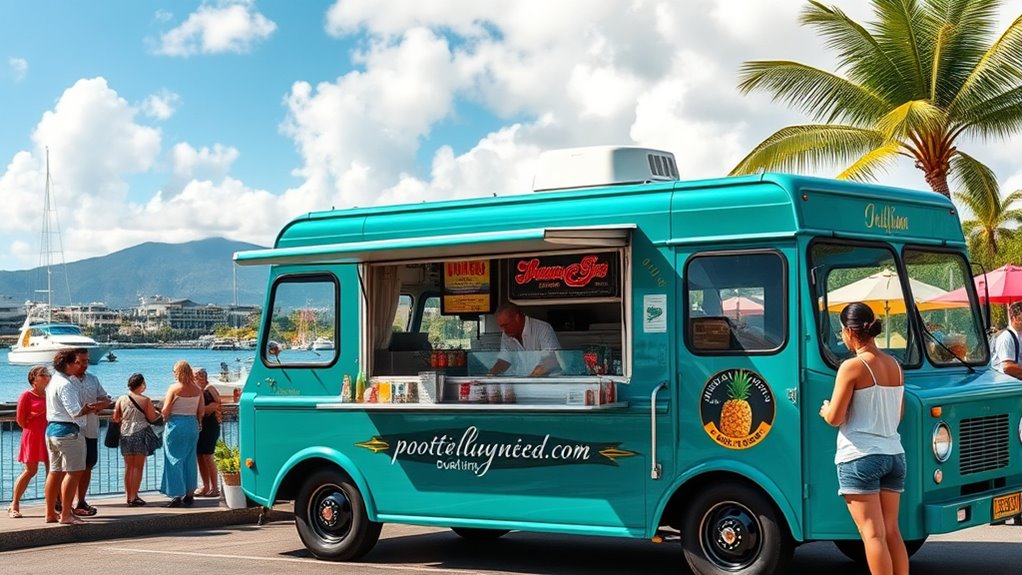
Effective marketing is key to expanding your food truck’s presence in Hilo’s competitive scene. Leveraging social media platforms like Facebook, which 75% of trucks use, can boost visibility and sales by 20%. Regular posts, stories, and ads keep your audience engaged and informed about your locations and offers. Participating in local festivals and events, embraced by 80% of food trucks, helps attract new customers and build community ties. Using mobile apps and GPS tracking makes it easier for customers to find you, increasing discoverability and repeat visits. Loyalty programs, whether digital or through social media, can increase repeat business by 30%. Additionally, analyzing data for targeted marketing enhances your ROI by up to 25%, making your efforts more efficient and effective. Data-driven marketing strategies also enable you to better understand customer preferences and tailor your offerings accordingly. Incorporating customer feedback can further refine your marketing approach and improve overall satisfaction.
Frequently Asked Questions
What Are the Specific Parking Restrictions for Food Trucks in Hilo?
You need to follow Hilo’s general parking rules for food trucks. Avoid parking on highways or busy roads, as they’re prohibited for safety reasons. Stick to permitted areas, like designated parking zones or spots with no posted time limits, and pay meters where required. Always check local signage and regulations, and get your permits from the Department of Health to guarantee you’re compliant. When in doubt, consult local authorities.
How Can I Find Approved Support Kitchens in Hilo?
You can find approved support kitchens in Hilo by checking local resources like Mālama Da Farmer and The Kohala Center, which provide updated lists and contacts. Visit the Hilo Food Hub website for detailed info on memberships and rental packages. You can also call individual kitchens directly to inquire about availability, services, and pricing. These options help guarantee you access compliant spaces to prepare your food.
Are There Any Restrictions on Alcohol Sales From Food Trucks?
You’ll find restrictions on alcohol sales from food trucks in Hawaii. Permanent liquor licenses aren’t issued, so you can only sell alcohol via temporary permits for special events, which cost between $150 and $1,200. You must apply through local agencies and comply with specific zoning, safety, and licensing rules. Be aware that alcohol sales are limited to permitted event venues, and selling outside these settings can lead to penalties or license revocation.
What Are the Peak Times for Food Truck Business in Hilo?
You want to know when your food truck can expect peak business in Hilo. Typically, you’ll see the highest customer flow on Wednesdays and Saturdays at farmers markets, weekends during outdoor events, and special local festivals. Peak times often occur from late afternoon to early evening, around 2 pm to 8 pm, aligning with meal times and social gatherings. Seasonal tourism and location also markedly impact your busiest hours.
How Do I Handle Permit Renewals and Ongoing Compliance Requirements?
You need to stay on top of permit renewals by submitting your application before the two-year expiration date using the forms from the Hawaii County health department. Keep your food truck compliant with sanitation standards, and be prepared for periodic inspections. Maintain records of safety protocols, update your operational info, and stay informed about any regulatory changes. Contact health officials like Beth Dykstra if you have questions or need assistance.
Conclusion
Starting your food truck in Hilo is like planting a seed in fertile ground—your passion and dedication will help it flourish. By steering permits, choosing the right location, crafting a menu locals love, and marketing smartly, you’re setting yourself up for success. Remember, each step is a crucial stitch in your vibrant tapestry of flavors. Stay persistent, and watch your dream blossom into a beloved part of Hilo’s lively food scene.
